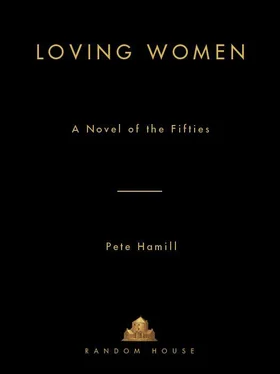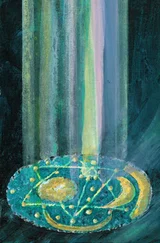And then sound came rushing back in and I heard grunting and then a phwocking sound and a man’s wordless high-pitched voice yelping in pain. And started to get up, and saw Sal on my left, swinging a gnarled tree branch like a club, hitting Buster on the arms and elbows and hips, while Max grappled with a fourth man, and still another came on a run, to leap on Max’s back.
I got up, my heart pounding wildly, and dived for the man on Max. I grabbed his jacket, which tore down the middle, and then I stepped to the side and punched as hard as I could to the man’s ear. He let go of Max’s neck, holding his ear in pain, and staggered away. I bent him in half with a kick in the balls and then Sal came up, slowly and deliberately, Buster now on his face in the dirt, and hit the big man with the three-branch club and finished him off. We looked at Max. He had another man above his head now, like a strong man at a circus. And he ran forward and rammed the man against a tree.
It was over.
We stood there, panting, dirty, battered, and looked at what we’d done. Five huge men were unconscious on the dark field.
“Jesus Christ,” I said.
“Don’t start,” Sal said.
We could hear the sounds of insects again, filling the night, and the band still playing a way off. Nobody seemed to have left the hall; the preacher must have held them back. And there was no sign of Sue Ellen.
Max said, “You know something? These guys might be dead.”
Sal looked at him and then at the tree branch in his own hand. His eyes were still wild, as if he wanted more, and I thought for a moment that he looked like Alley Oop. He swung the branch like a bat and hurled it into the trees and then began to laugh wildly.
We hurried back across the highway to the locker club and were changing clothes when we heard the distant sound of a siren. “Jesus, it’s just like the movies,” Sal said. “The killer’s in the building and he hears the cops coming, the sirens and all, and he starts to yell down at them — at Charles Bickford, who always has the fuckin bullhorn — and he says, ‘Up your hole with a Mell-o-roll, coppers, you ain’t takin’ me alive !’ ” Max laughed, pulling on his whites, and said, “Why do they do that in the movies anyway? To warn the bad guys? The cops must be amazing schmucks …” I said it might just be an ambulance out there. “Those guys are pretty fucked up,” I said. And Max said again that they might even be dead. Sal didn’t want to wait around to find out. “Come on,” he said, and with Sal leading the way, we slipped out of the locker club in our dress whites. The sirens went past the locker club toward the church, but we were out back, walking in the shadows of the palm trees to the main gate of Ellyson Field. Then a car pulled into Copter Road and Sal jumped out and waved at it.
“Hey, we need a ride , man.”
The car stopped. A shiny new red Mercury. Max and I hurried over. Mercado was alone behind the wheel. He looked at us and smiled.
“Get in,” he said.
In the early sixties, after my first wife died, I went out for a while with a red-haired stripper who loved to see me fight. She did an act at the Hudson Theater, undressing herself in a giant wine-glass filled with dirty pink water. She believed in Rosicrucianism and lived like the guy in the Rosicrucian ads, who slept each night on the edge of a cliff. To her, danger was a religious experience. Wherever we went she caused trouble, giving various men the eye, then getting indignant when they came on to her, and stepping back to watch me fight for her outraged honor. I got so mad at her one night on the East River Drive, my hands raw and my suit ruined, that I pulled the steering wheel right off its shaft while screaming at her and had to grab the naked top of the shaft with both hands to keep from dying. As I sat there panting, she just laughed and then started to play with me. That was the last time I saw her and I heard later that she’d been shot to death by a female lover in a hotel room in Baltimore. There are women like that, and when I look back, I realize that little Sue Ellen was surely one of them.
All through the next day I hung out in the barracks, expecting the imminent arrival of the Shore Patrol. They would take me off to the Pensacola jail and little Sue Ellen, prim and clean, would breathe hard, making all the cops look at her breasts, and pick me out as the man who said that Jesus was a Jew. Then she would leave for Buster’s funeral and I would spend the rest of my adult life in Portsmouth Naval Prison, or take a shorter trip to the Florida gas chamber.
But the Shore Patrol never came for me, and on Saturday evening I went out and changed clothes at the locker club and took the bus to town, slouching low as we passed the Baptist Church. It was too early for my date with Eden Santana, but I didn’t want to be late, so I sat for almost an hour on a bench on Garden Street. I was uneasy: I didn’t know where I would take her or what we would do; she’d just smiled and told me she would meet me. I said her name out loud: Eden Santana . Then whispered it: Eden. San. Tana . A beautiful name, I thought, shuddering at the hard ending of the first name and its promise of paradise. The second name was made of all those female vowels (for surely consonants are male) and rolled in a wave when you said it, like the name Pensacola itself. I wished I had a hundred dollars to spend without care for tomorrow or next week or the rest of the Navy month. Then, if I could sort out the words, I’d ask her to go with me to the San Carlos. To sleep with me between silk sheets. I’d whisper her name at midnight. First name and last, paradise and vowels. Eden Santana, Eden Santana . Like a decade of a wicked rosary.
She was due to finish work at six and ten minutes before the hour I got up and crossed Garden Street and walked slowly down the street toward Sears. I stopped at the alley and felt a sudden attack of hopelessness. Her bicycle wasn’t there. And if her bicycle wasn’t there, she probably wasn’t there either. I dawdled past the store and glanced through the windows, as casually as possible. I didn’t see her inside. Maybe she’s gone , I thought, feeling lost and alone in a town that wasn’t mine. Maybe she’d realized it was ridiculous to be seeing a kid like me on a Saturday night in a town full of men. Men with money. Fliers. Officers . Men who’d been around the world and back, flown combat missions, faced death. Men like Mercado. Down the street I saw the neon blinking on outside Trader Jon’s, but in my mind, I imagined her waking up on Saturday morning, thinking, “Oh, that damned kid,” and lying there deciding to call in sick so she wouldn’t have to see me. Maybe there was a guy lying in bed beside her. Smoking a cigarette, while she phoned in her lie. Speaking to her in Spanish later. She touched his face and smiled, saying, “I can’t go to town today.” Then lighting a cigarette. Then adding, “I have to stay here.” And the man did not protest because the man, of course, did not want to leave her. He reached out, touched her nipples, whispered her name.
I stopped at the corner just past Sears, and leaned on a lamppost, looking up and down the street. I hoped none of the gang would see me. I didn’t want them asking me what I was doing standing on an empty street in Pensacola. They’d think I was a degenerate or something. Or they’d drag me down the street to Trader Jon’s, or out to the Dirt Bar. And I didn’t want to go to either place; this little hour belonged to me. Most of all, I couldn’t tell them the truth. “I’m waiting for a woman named Eden Santana.” I couldn’t say that, admitting with my tone that I cared for the woman and was disappointed in her absence. We were sailors. Ah remember the days (the Old Salt said) when men were men and women were carpets and all the ships was wood . Anchors Aweigh, my boys. Bell-bottom trousers, suit of Navy blue, I love a sailor boy and— No. I couldn’t say anything to them.
Читать дальше












